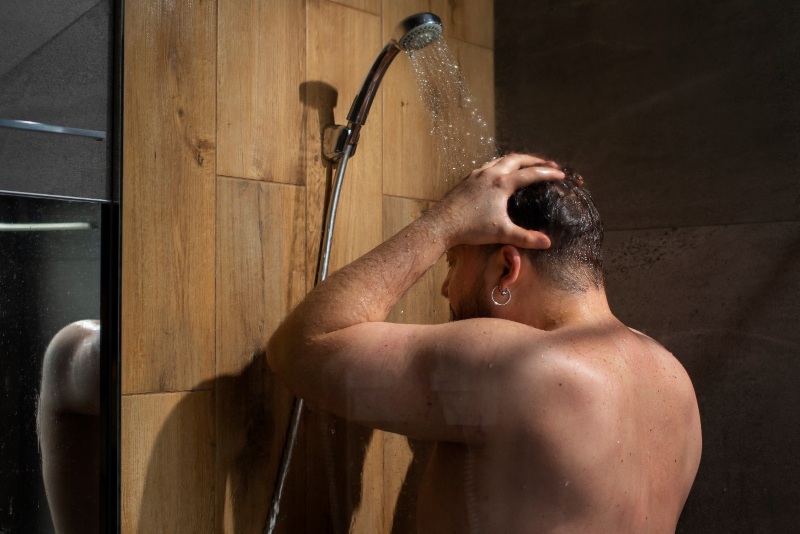The post-workout shower is often seen as a non-negotiable part of many fitness enthusiasts’ routines. For some, it is simply a matter of personal hygiene, while for others, it is believed to offer benefits for muscle recovery.
In recent years, cooling body wash products have entered the market, claiming to provide relief and support for post-workout muscle recovery. But does taking a shower, especially with a cooling body wash, truly help in the recovery process?
In this article, we will delve into the science behind post-workout showers and explore their potential role in aiding muscle recovery.
Table of Contents
The Science of Muscle Recovery
To understand how a post-workout shower might aid in muscle recovery, it’s essential to know what happens to our muscles during exercise.
When we engage in physical activity, especially intense or prolonged exercise, our muscles experience microscopic damage, causing inflammation and the release of waste products such as lactic acid. This damage triggers the body’s repair process, leading to muscle growth and increased strength over time.
Muscle recovery involves reducing inflammation, removing waste products, and repairing damaged muscle tissue. Various factors, including nutrition, hydration, sleep, and active recovery techniques, play a role in supporting this process. But where does taking a shower fit into the equation?
Temperature and Muscle Recovery
Temperature is one aspect that could contribute to the advantages of a post-workout shower. Athletes have traditionally utilized cold showers or cold water immersion as a rehabilitation tactic.
Blood vessels can be helped to constrict by using cold water, which can lessen muscular swelling and inflammation. Additionally, by encouraging a quicker blood flow return to the heart, it could help flush away waste materials.
On the other hand, taking a warm or hot shower can promote blood circulation, which will assist the muscles to get oxygen and nutrients more effectively. This improved circulation can also help remove waste products from the muscles, promoting a faster recovery. Some individuals may prefer alternating between hot and cold water (contrast water therapy) to combine the benefits of both temperature extremes.
Relaxation and Stress Relief
Another potential benefit of taking a shower post-workout is its ability to promote relaxation and stress relief.
Exercise is a natural stress reliever, and combining it with a soothing shower can further enhance this effect. As stress can negatively impact muscle recovery and overall health, taking a shower after exercising may indirectly contribute to a more effective recovery process.
Using a cooling body wash during your post-workout shower can heighten the relaxation experience. Cooling body wash products often contain ingredients like menthol or eucalyptus, which provide a refreshing and invigorating sensation on the skin. This sensory experience can help you unwind after a challenging workout, further reducing stress and promoting relaxation.
Improved Sleep
Sleep is a crucial factor in muscle recovery, as it is during this time that our bodies repair and rebuild damaged muscle tissue. Taking a warm shower before bed has been shown to help improve sleep quality by promoting relaxation and facilitating a drop in body temperature, which is necessary for falling asleep.
While a cooling body wash may not directly impact sleep, the relaxation benefits of using a post-workout shower as part of your evening routine may contribute to a better night’s sleep. In turn, this improved sleep can support more efficient muscle recovery.
Conclusion
While taking a shower post-workout, particularly with a cooling body wash, may not directly repair damaged muscle tissue, it can contribute to the overall recovery process in several ways.
By manipulating water temperature, showers can help reduce inflammation, improve blood circulation, and facilitate the removal of waste products. Additionally, by encouraging more restful sleep and lowering tension, the relaxing and stress-relieving effects of a shower, reinforced by the sensory sensation of a cooling body wash, may indirectly improve muscle recovery. Even while a post-workout shower may not be a miracle cure for muscle regeneration, it may be an important part of an all-encompassing recovery program.
In conclusion, including a post-workout shower in your exercise program, especially with a cooling body wash, can provide a number of advantages that may help with indirect muscle healing. You may develop an efficient and comprehensive strategy to assist you in recovering from your exercises and continue moving towards your fitness objectives by using this practice with other evidence-based recovery tactics.
